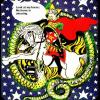Howdy, Stranger!
It looks like you're new here. If you want to get involved, click one of these buttons!
If you have an email ending in @hotmail.com, @live.com or @outlook.com (or any other Microsoft-related domain), please consider changing it to another email provider; Microsoft decided to instantly block the server's IP, so emails can't be sent to these addresses.
If you use an @yahoo.com email or any related Yahoo services, they have blocked us also due to "user complaints"
-UE
If you use an @yahoo.com email or any related Yahoo services, they have blocked us also due to "user complaints"
-UE
I was reading an article about the state of criticism today, and...
2012-07-24 04:19:43
edited 2012-07-24 04:19:43 in Media
if u do convins fashist akwaint hiz faec w pavment neway jus 2 b sur
It doesn't matter that the article is great and that the author is one of the most respected critics in the country - at first, I just had trouble taking it seriously when, on the portrait next to the headline, the guy looks like the most stereotypical neckbeard.

Cognitive bias can be a bitch.


Comments
What kind of criticism? Is the article in moonspeak and if not, can you link it, cos I'm curious now.
In my mind, the attractiveness of the author is proportional to the quality of the article.
So David Wong is pretty much the handsomest dude alive.
^^^ He looks really young, actually.
Gotta give him props though, he really went all-out with the neckbeard look. Because Jesus Christ, look at that.
It's in Serbian, and in a magazine, so sorry. It's about the degradation of criticism in general, mostly stuff about Serbian internet critics being too politically colored; probably nothing too interesting for you guys.
Apparently, he's 31. I thought the same as you, and was surprised since, from what I had heard of him before, he's got a relatively long experience in criticism, screenplay and directing.
I don't think political colouration is unique to Serbia, though. Sure, Serbian critics likely experience media through the auspice of Serbian politics, so there will be some interpretations that reflect that.
Yesterday, I was reading a review of the film Anonymous, which posits the theory that Shakespeare was a frontman for someone else's works of literature and theatre -- an Earl, or Duke, or whatever. The exact title and name of the "true" author escapes me now. The review took the perspective that the film was reclaiming the works of Shakespeare for the bourgeois. It was an interesting read and I'm hard pressed to disagree, having seen the film and being able to follow the interpretation on that level.
But it's still a politically coloured perspective, you know? The critic takes the side of the common folk of both today and the late Renaissance, and that's something I'm sympathetic to. And it's obviously something that's worth being read, heard and discussed, because so many aspects of the interpretation appear, to me, to be right on the money. But I can't shake the feeling that there's a level of judgement there that condemns the film moreso for its political bias in favour of the upper class rather than its merits as a piece of cinema. And trust me, I'm all for declawing the upper class, but it's troublesome from an artistic standpoint.
When it comes to criticism, I think there's almost inherently a clash between art and politics at times, and it's difficult to know which side to fall back on. After all, what do you say about a film that is technically brilliant, well-written, well-directed and well-acted, but one you also find morally questionable or even reprehensible? Do you give the film three-and-a-half stars for its artistic merit, or does it get one or two stars because of how bothersome it was to you?
Indeed. There is also that old debate on whether Leni Riefenstahl's films should be considered good art - on the one hand, they are artistically and tehcnically brilliant, but on the other hand, they're fucking Nazi propaganda.
I'd say that, due to the recent and still ongoing political turmoils, the way political bias generally shows up in Serbia, in reviewing domestic works, is way more problematic than that - most of the time, it's either the fanatically pro-Western critics looking for cues to label the author as a regressive, nationalistic primitive, or the nationalists hunting for traitors, spies and foreign mercenaries, and rating the work on that basis. It shows up in reviews of literally any work with society or history as its subject matter, and is really, really frustrating.